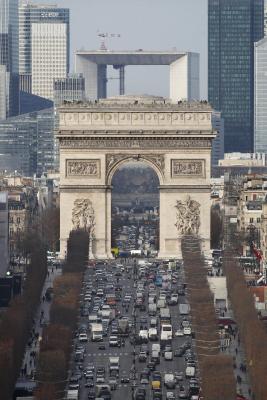AIT OURIR – A few weeks before she was killed in a raid by French special forces beside the suspected ringleader of last November’s Paris attacks, Hasna Ait Boulahcen packed her bags and said her last farewells to relatives in Morocco.
The 26-year-old Parisian’s almost two-month-long trip to her father’s home town of Ait Ourir proved to be one of the last stops on her journey from fun-loving party girl to devout Muslim – and possibly Islamist militant.
Conversations with relatives and family friends shed light not only on her transformation but also on the role of Moroccan intelligence in helping services in France and Belgium trying to counter the threats of Islamist militant attacks.
Ait Boulahcen’s stay in Ait Ourir from early August until late September is now part of the investigation into the attacks which killed 130 people and were claimed by Islamic State, and has increasingly drawn in Morocco’s intelligence services.
On Nov. 18, five days after the Paris attacks, she and her cousin Abdelhamid Abaaoud were killed in a barrage of bullets when special services opened fire on the apartment she had led him to in the French capital, possibly as a hideout.
Morocco provided the tip-off that enabled French police to locate Abaaoud, has been holding Abaaoud’s brother Yassine since October and has issued an arrest warrant for Salah Abdeslam, who is suspected of taking part in the attacks and is on the run.
A week after the attacks, French President Francois Hollande received King Mohammed of Morocco in Paris to thank him for Rabat’s “efficient help”.
On Nov. 23, after it became clear some of the attackers had planned the attacks from Brussels and were of Moroccan origin, Rabat said Belgium’s King Philippe had also called King Mohammed to enlist the help of the North African country’s intelligence.
“We are exchanging information with them on a very professional and very good level,” said Alain Winants, who was head of Belgium’s intelligence service from 2006 to 2014 and is now Advocate General at Belgium’s Supreme Court.
Security has been tightened in Ait Ourir, a dusty potato-growing town in central Morocco where Ait Boulahcen’s father Mohammad has a modest concrete home. Relatives and neighbours told Reuters they had been questioned by police, who kept a close watch on the town from cars parked on many street corners.
The Moroccan authorities have not said what their inquiries have thrown up but a relative in Ait Ourir told Reuters that Ait Boulahcen was accompanied by one of her brothers when she arrived in early August and the other brother joined them later.
She was stopped at the airport when she flew in, one of her uncles said, but was allowed to enter the country when her father and an uncle gave the authorities their addresses.
It was not clear why she was stopped or whether she was on any security watch list. Police did not comment.
Ait Boulahcen, her brothers and a sister were born in France to their father’s second Moroccan wife after his first marriage, which produced two daughters and a son, broke down. He returned to Morocco from France when his second marriage also collapsed.
Relatives and neighbours saw a huge change in Ait Boulahcen this summer. She had ditched the modern clothes she wore during her first visit to see her father in 2013 and now had on the full face veil favoured by more conservative Muslim women.
“She said she wanted to come back and get Moroccan identity papers and a passport,” he said, without making clear how far she had got.
He and other family members said they believed Abaaoud had exploited his cousin’s naiveté and led her astray. How close they were is unclear but Ait Boulahcen’s half-sister, Nezha, said they had not discussed Abaaoud during her stay.
Aitboulahcen unwittingly led police to Abaaoud by speaking to him on her mobile phone, which was tapped as part of a drugs investigation. Police then saw her meet Abaaoud and lead him to the apartment where they and a third suspect were killed.
French police located Abaaoud after they received a tip-off from Morocco that he may still be in France and honed in on Aitboulahcen. Until then they thought he had fled the country.
It is not clear why Abaaoud’s younger brother Yassine has been held since landing in Morocco in October. Their father, Omar Abaaoud, declined comment.
European intelligence has cooperated with Rabat since guest workers from Morocco began arriving in the 1960s because monitoring them was impossible without knowledge of their culture and languages, Moroccan Darija and Amazigh, experts say.
Morocco has stepped up its tracking of militant cells since Islamist attackers killed 17 people in Marrakesh in 2011.
“Morocco has shown itself to be extremely reactive in passing on crucial information that has prevented terrorist attacks and whose value has been appreciated by countries targeted, ranging from France to Spain and the United States,” said Moroccan scholar El Mostafa Rezrazi, author of a book on security cooperation between Morocco and Europe.

